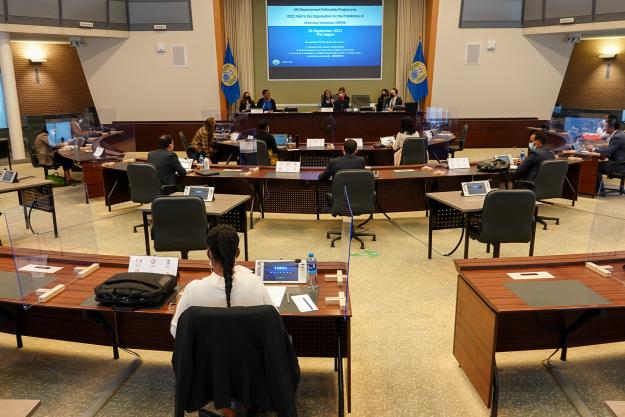
THE HAGUE, Netherlands–24 September 2021–The Organisation for the Prohibition of Chemical Weapons (OPCW) held a seminar for the United Nations Disarmament Fellowship Programme on 24 September at its Headquarters in The Hague. The programme aims to help officials from UN Member States to build their expertise in disarmament and non-proliferation issues.
The Disarmament Fellows were welcomed by the OPCW Deputy Director-General, H.E. Ms Odette Melono, who noted in her opening remarks that immense strides had been taken towards achieving a world free of chemical weapons. She added: “The Chemical Weapons Convention is a prime example of the tangible and concrete gains that can be made for peace and security through effective and patient multilateral efforts.”
During the event, the Disarmament Fellows were briefed by senior members of the Technical Secretariat on a range of topics, including the OPCW’s mission and operations to counter the threat of chemical weapons, programmes to enhance and promote international cooperation among its Member States, the OPCW’s activities in Syria, the verification regime of the CWC, the role and function of the OPCW laboratory, as well as future priorities and challenges for the Organisation. In addition, the Fellows were given a comprehensive presentation on the OPCW’s Centre for Chemistry and Technology which is currently under construction outside The Hague.
This year’s group of 19 Fellows represented the following states: Bangladesh, Brazil, Bulgaria, Chad, Cuba, Equatorial Guinea, Georgia, Kazakhstan, Kenya, Kyrgyzstan, Lebanon, Lithuania, Madagascar, Malaysia, Mali, Mexico, Saudi Arabia, Syrian Arab Republic, and Zambia.
Background
The Disarmament Fellowship Programme was launched by the United Nations General Assembly in 1978 at its first special session devoted to disarmament. The initiative aims to build the capacity of officials from United Nations Member States to enable them to participate more effectively in international discussions and negotiations on disarmament and non-proliferation issues.
Lasting between ten and 12 weeks, the Programme brings the Fellows to UN Headquarters in New York and international organisations in Brussels, Geneva, Vienna, and The Hague. The OPCW has been hosting groups of Fellows almost every year since 1998.
As the implementing body for the Chemical Weapons Convention, the OPCW, with its 193 Member States, oversees the global endeavour to permanently eliminate chemical weapons. Since the Convention’s entry into force in 1997, it is the most successful disarmament treaty eliminating an entire class of weapons of mass destruction.
Over 98% of all declared chemical weapon stockpiles have been destroyed under OPCW verification. For its extensive efforts in eliminating chemical weapons, the OPCW received the 2013 Nobel Peace Prize.
